Accounts of Ladies Assaulted by Rabaa Protestors
November 21, 2013 | Nadine El SayedThese past two weeks have seen a pattern of assaults on women in their cars passing through pro former president Mohamed Morsi marches. The news ranged from verbal assault to smashing windshields and all the way to physical assault on men or women in the car. The victims are sometimes veiled, often not, and have often done little to provoke the assaulters, safe for a small honk or slight clues of impatience.
Three ladies of different ages, between early 30s and 40s, and backgrounds tell us how they got verbally and physically assaulted at pro-Rabaa marches in Heliopolis and Dokki. One thing the three ladies have in common; they’re all unveiled.
Heba El Hadidy, November 3rd, Galaa Square, Dokki.
El Hadidy, a blonde, was driving her BMW X1 at 9pm on the day of Morsi’s trial and was heading towards Sabaa’ Omarat when she faced a total traffic block as Rabaa protestors completely blocked half the lanes on the streets and let cars pass one by one through the other lanes at times and blocking it at others.
“I started seeing Rabaa flags and by the time I got closer to the square there was a boy of 16 redirecting traffic away from the marches,” El Hadidy recounts. “By the time it was my turn to pass, they blocked the free lane again so I opened my window and said ‘please, let me go I have been waiting for a very long time and I am in a hurry.’ They gave me a disrespectful look and looked the other way.”
At this point, El Hadidy shortly honked her horn once to pass and an older man in his sixties, who was also carrying a Rabaa poster, approached her and asked her to open her window. He told her to relax and not to honk as it will provoke them, he added that they’re young kids and they’re enthusiastic so she should just relax and it will pass.
She was closing her window when another man jammed a Morsi poster inside the car and onto her face yelling “boo.”
“So I pushed his hand away and the second I did this he hit me with his elbow on my head and then everyone started surrounding the car and the crowd started kicking the car with their shoes,” El Hadidy recounts. “On the left side there were people intervening and urging the attackers to stop, but the right sight was smashed badly, my door has several indents and my bumper was broken.”
The men started arguing in between themselves and El Hadidy seized the chance and ran. She is confused as to why this happened and says she was well-covered, except her hair, and was wearing a loose sweatshirt.
http://www.youtube.com/watch?v=f2ZOoO8bfUU&feature=youtu.be
Hania Moheeb, November 1st, Heliopolis Square.
Moheeb was in the car with her husband when they saw a crowd of Rabaa protestors cutting the road off. They were showing the Rabaa signs and waving them on the cars’ windshields. Her husband was in a hurry so he honked their horn a “simple, short and very normal honk,” says Moheeb.
“So the protestors kept telling him ‘stop, stop, stop,’ and ‘relax, relax, relax’ and then they banged on the car, jumped on it and one of them opened the car and tried to get me out but I shut and locked the door immediately,” she recounts. “We managed to escape by they broke our windshield and caused several indents.”
Moheeb car wasn’t the only one attacked, they were attacking several other cars. immediately took a picture (shown above) and posted it on Facebook to warn people and in a few minutes several people reported the incident to the police, so on their way back from fixing the windshield a couple of hours later, the marches were dispersed and five military tanks were in the area.
Moheeb thinks the assaults were haphazard and “meant to terrify people.” “I am sure many of those protestors are [hired] thugs as none of the protestors came to our help except one single man who kept telling them to stop.”
Moheeb had been sexually harassed by a gang of thugs in Tahrir Square on January 25th, 2011 and went public with the incident. “Tahrir was different, the Tahrir harassers look like the kind of thugs the state hires to scare us off, ” she says. “Those who attacked us two weeks ago didn’t look anything like the harassers in Tahrir, they were mostly bearded.”
She adds that having dealt intensively with the Muslim Brotherhood during the January 25th sit ins, she believes that followers and members do not use violence unless there are clear orders from their leadership to do so.
Pakinam Amer, November 17th, Nozha Street, Heliopolis.
Amer was in her car stuck in traffic caused by pro-Rabaa march and as protestors passed by her she “turned off the music in respect to their march, sat silently and tried not to stare too much.”
“But I had men coming up to my open side window waving Rabaa signs in my face in all rudeness, telling ‘Shofty ya mozza? Baseity kowayes ya mozza?’ [Did you see it, sexy? Did you have a good look, sexy?] taunting me and trying to provoke me to answer back. I didn’t. It took a mountain of will not to but I had heard stories of women being attacked the same morning by pro-Morsi protestors” Amer recounts. “So I swallowed my pride and shut the hell up.”
But the ordeal wasn’t yet over, a few minutes later, a different crowd of men did the same thing. “They looked like they enjoyed it, probably feeling empowered by the surrounding crowds of supporters,” she adds. “The rest of protestors — many middle-class-looking people, so not thugs at all — were in earshot for the harassers weren’t one bit subtle and incredibly loud […] so I bet a few heard what was said to me and not one protested against my humiliation.”
“Was it my exposed hair that provoked it? The fact that I was a girl in the driver’s seat? Maybe the fact that I wasn’t waving the Rabaa sign myself, or signaling in support with my hand? I mean, do I have to?! I’m at a loss to what could’ve brought about the assault,” Amer concludes.

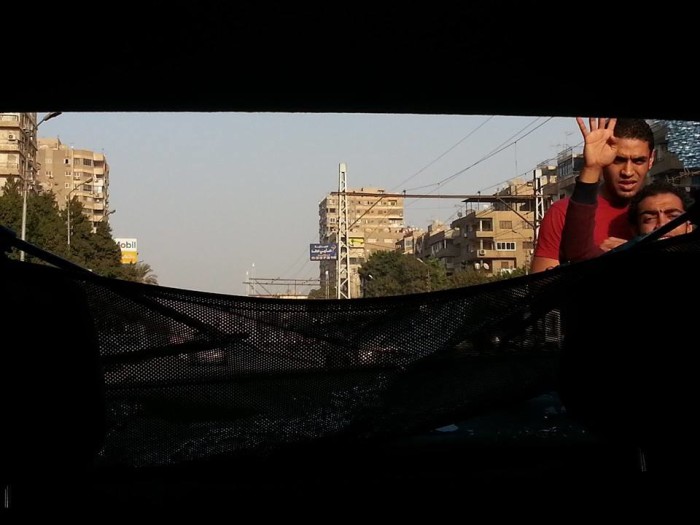
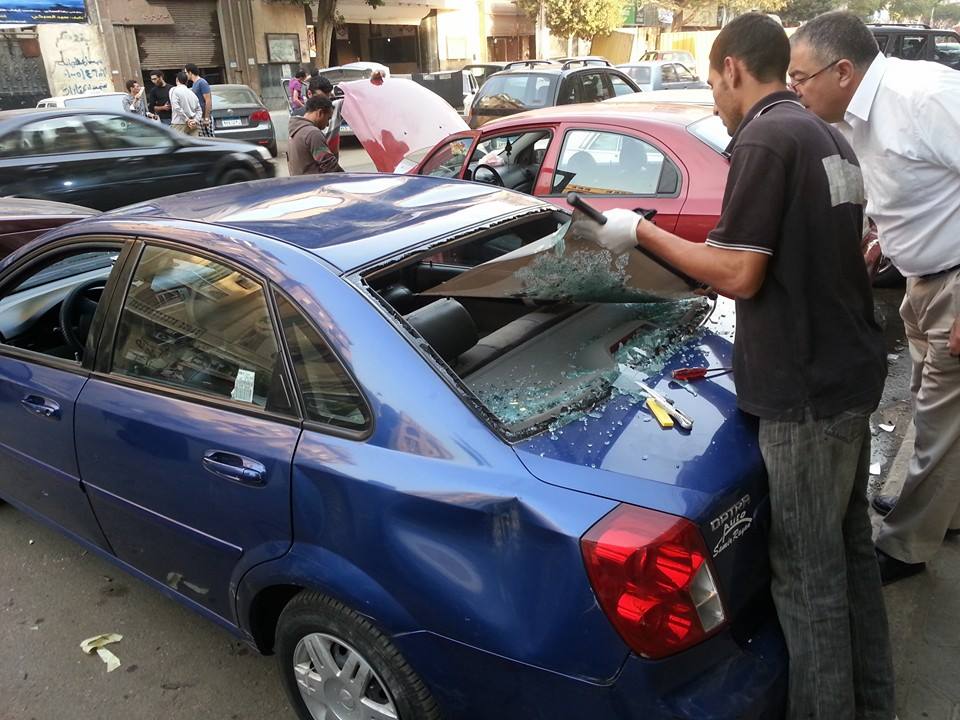

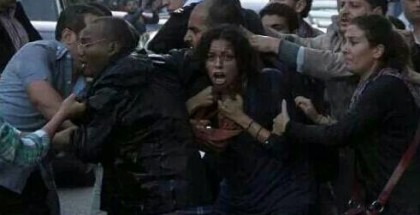

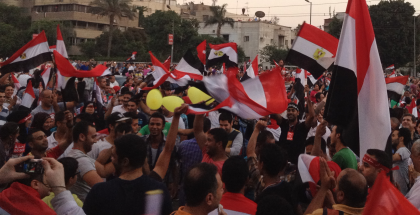
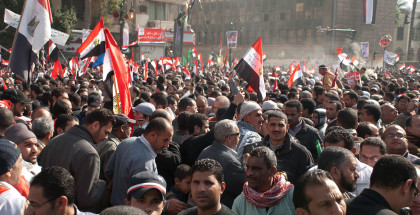














Submit a Comment